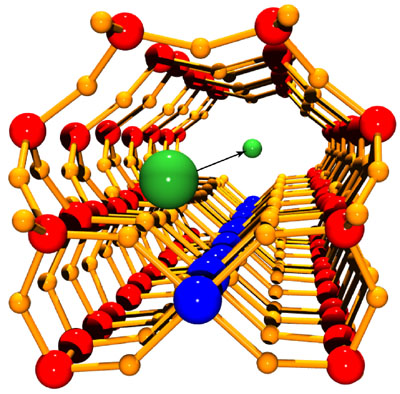Schwarzenegger proposes $95 million
for clean technology, biotech, nanotech

Illustration courtesy Purdue
University
By Jeff Shuttleworth, Bay City News Service
December 27, 2006
Gov. Arnold Schwarzenegger said today that he will propose nearly
$95 million in the state budget to create an initiative to fund
projects in key sectors such as clean technology, biotech and
nanotech.
Schwarzenegger said his "Governor's Research and Innovation
Initiative" is aimed at reaffirming California's position
as a world leader in advanced research and innovation that creates
jobs while preserving the environment.
The governor's budget provides $30 million in lease revenue bonds
for the Helios Project, an initiative by the University of California's
Lawrence Berkeley National Laboratory to create sustainable, carbon-neutral
sources of energy.
In a conference call, Berkeley Lab director Steven Chu said the
project will produce the next generation of super-efficient solar
energy technology aimed at helping to reduce greenhouse gases
and oil dependency.
He said the project's goals are to generate clean sustainable
alternatives to hydrocarbon fuels, develop new energy sources,
improve energy conservation and reduce greenhouse gas emissions.
The $30 million will be used to build a new energy/nanotechnology
research building for the Helios Project.
Schwarzenegger's budget also provides $40 million in lease revenue
bonds to the University of California for UC Berkeley or UC San
Diego in the event that either wins a global competition for the
British Petroleum Energy Biosciences Institute grant.
Those campuses are among only five universities in the world
that have been invited to compete for a $500 million grant to
build and operate an Energy Biosciences Institute, which will
be dedicated to long-term research into the production of alternative
fuels.
The governor's budget also provides $19.8 million for the California
Institutes for Science and Innovation, which is a multidisciplinary
research effort by UC working in partnership with private companies
in the areas of information technology, biomedical research and
nanotechnology.
In addition, the governor's budget provides the first $5 million
increment in state matching funds to enhance UC's bid to build
a $200 million super computer, called a Petascale computer.
The Lawrence Livermore National Laboratory, the Lawrence Berkeley
National Laboratory and UC-San Diego are in the running for the
super computer.
The Petascale computer, which is named for the speed at which
it can process information, will be the most powerful computer
in the world.
UC Vice President for University Affairs Bruce Darling said,
"Many states are trying to take the leadership role away
from California" in super computers but California is determined
to stay on top.
Darling said current super computers can process 1 trillion calculations
a second but the next generation will be 1,000 times faster and
perform 1 quadrillion operations a second.
In a statement, Schwarzenegger said, "As a leader in developing
new technologies, California will reap tremendous rewards for
our economy and environment from this investment in our innovation
infrastructure."
Assembly Speaker Fabian Nunez said, "Providing much-needed
state funding for Berkeley Lab's Helios Project in next year's
budget is a smart investment. The new technologies will be a boon
to our economy and carbon-neutral energy will go far in combating
the threat of global warming."
Copyright © 2006 by Bay City News, Inc. -- Republication,
Rebroadcast or any other Reuse without the express written consent
of Bay City News, Inc. is prohibited.
####
|